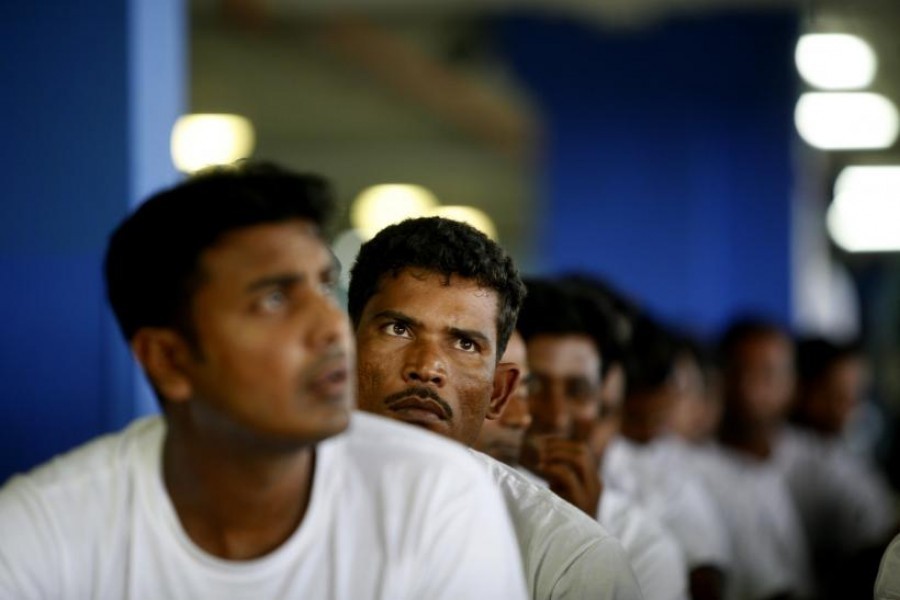Many migrant workers in KSA passing days half-fed
They can't seek help as the BD embassy hardly picks up phone calls

Published :
Updated :

Many Bangladeshi workers in the Kingdom of Saudi Arabia (KSA) were facing food shortage as they have no money left with them, workers said, alleging that there is a lack of support from the Saudi authorities as well as Bangladesh embassy there.
They said they have been struggling hard with insufficient foods for the last two weeks as many were having only one meal a day or passing their days half-fed. So, they are gradually getting weaker and would fall sick soon if the situation continues for a longer period, they added.
The Kingdom of Saudi Arabia (KSA) has imposed curfew in different areas of the country to prevent spread of COVID-19, leaving helpless the migrant workers who live on jobs of temporary nature.
Md Bashar, a taxi driver who lives in Jeddah, said he had money, but he sent home for family expenses just before imposing the lockdown. Yet the crisis is so acute now that sometimes he and his three other colleagues share a bread only, he added.
"I thought that the lockdown would continue only for one week and after that I could start working. So, I was not much worried about my expenses. But it has become uncertain by now as to when the lockdown will end," he told the FE over telephone, expressing frustration.
Like Bashar, majority of the workers from Bangladesh were not getting enough food. However, some others who have permanent jobs might be in a better position at this moment, he said.
The workers alleged that they were getting hardly any response from the Bangladesh embassy as the officials are not receiving the phone calls despite repeated attempts.
When asked, another worker Md Shahidullh,who also lives in Jeddah,said he and his room mates made a minimum of 100 phone calls to the numbers available online of the embassy office in Jeddah."No one picked it up."
He said: "No one from the embassy contacted us to know if we are alive or not."
He is living in a flat with 10 others for the last one and a half months. Many of the Bangladeshis living surrounding his building were also suffering from food. The ones who went to KSA one year or six months ago were facing more difficulties, he added.
When asked, Shahidullh said they did not get any fund from the Saudi government as they were working in small industries or their jobs are of temporary nature.
Meanwhile, Ovibashi Karmi Unnayan Program (OKUP), a grassroots migrants' organisation, informed that they received a significant number of phone calls from the migrant workers and their families since the outbreak of coronavirus in the major job destination countries.
Its chairman Shakirul Islam said they have so far received 1,200 to 1,300 calls from the workers and their family members at home. Of those, 60 per cent came from the KSA when the workers said they were not getting enough food.
Around 35 per cent calls came from the workers in Malaysia and rest of the calls were from other countries, he added
Mr Islam said the migrant workers' conditions were vulnerable as they lost jobs because of the lockdown. So, the embassy should keep regular contact with them and provide necessary assistances. The government should provide the workers with emergency fund.
The embassy should work in coordination with the authorities concerned in KSA and the Bangladeshi community which have charities there. Otherwise, he added, it would be very difficult to manage the large number of workers.
The embassy also should help the workers in receiving benefits from the Saudi government, he added.
Pervez Siddiqui, migrant rights activist and the executive director of Films 4 Peace Foundation, said the embassy officials should play proactive role in extending services to the workers. If the officials are not be responsive, it will be very difficult to address the crisis. If needed, they can appoint more manpower, he added
However, officials at the Bangladesh embassy in Riyadh did not respond to repeated calls made by the FE correspondent.
According to the officials at the Wage Earners' Welfare Board, the board has provided Tk 8.0 million to the Bangladesh embassy in Saudi Arabia to meet the essential needs of the workers who are in vulnerable condition.
Currently, around 2.0 million Bangladeshis are staying in Saudi Arabia for work.
arafat_ara@hotmail.com


 For all latest news, follow The Financial Express Google News channel.
For all latest news, follow The Financial Express Google News channel.